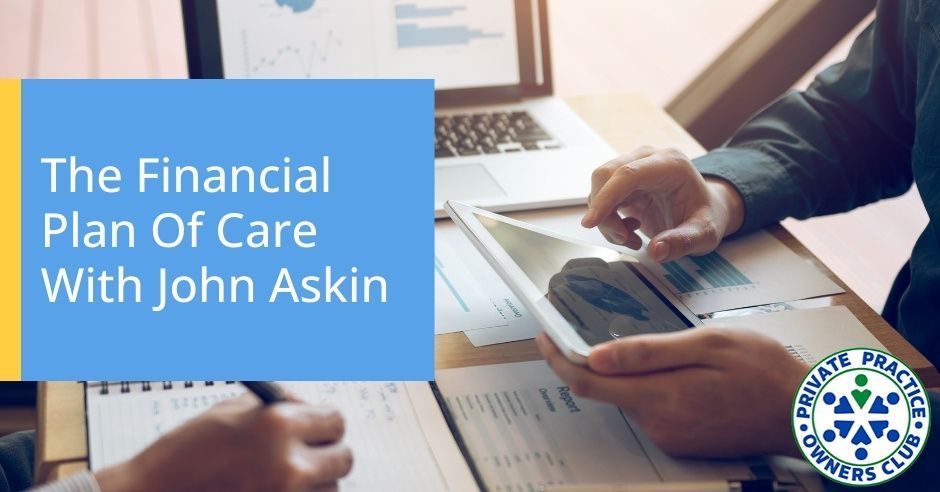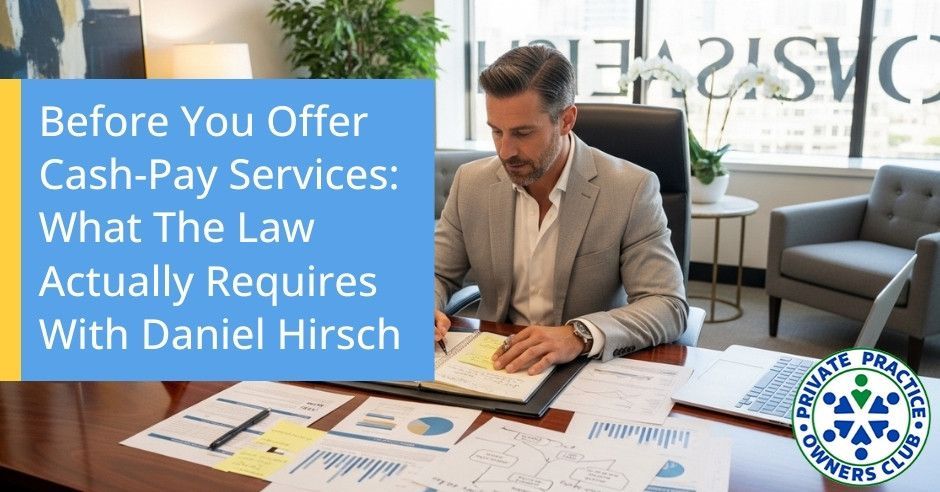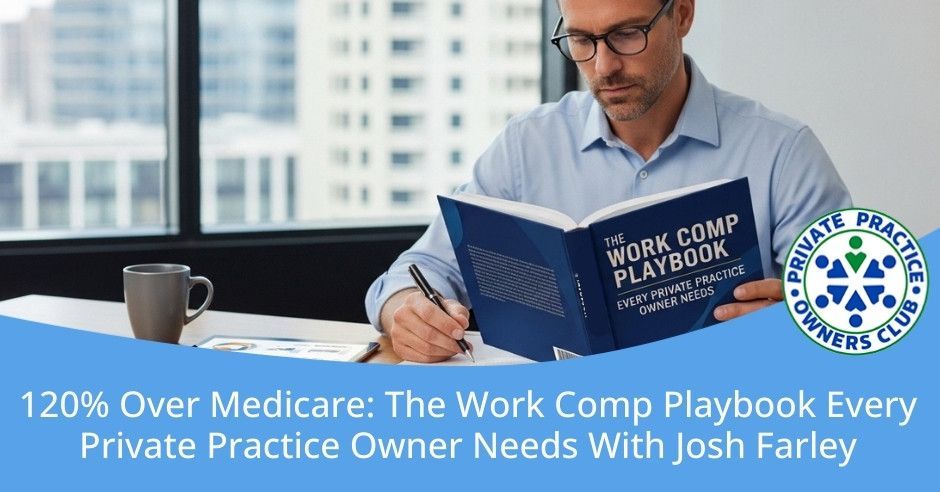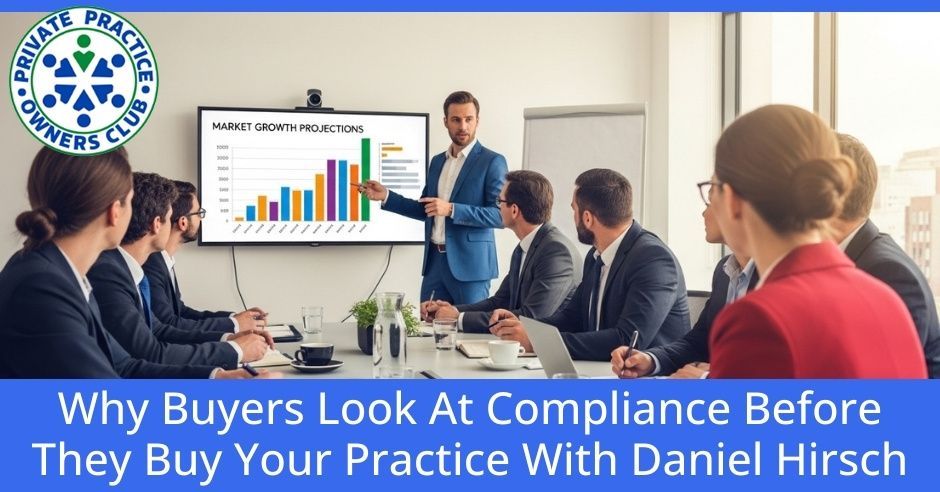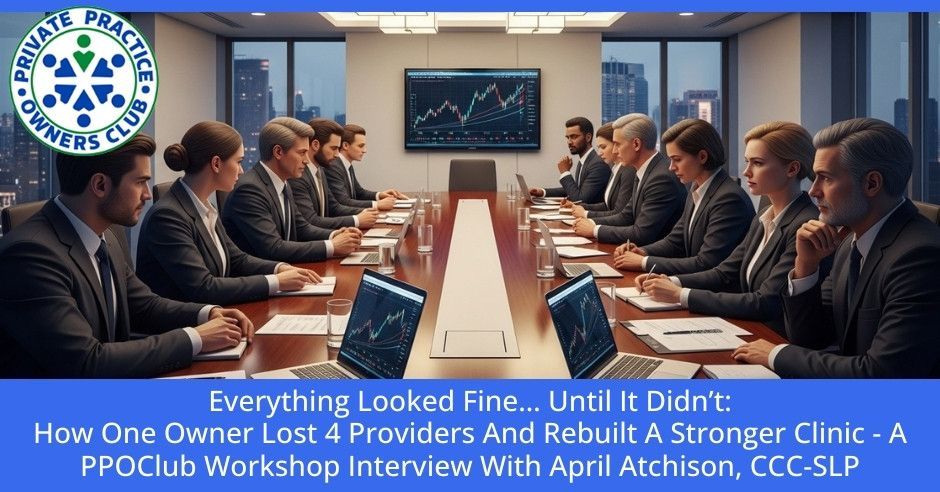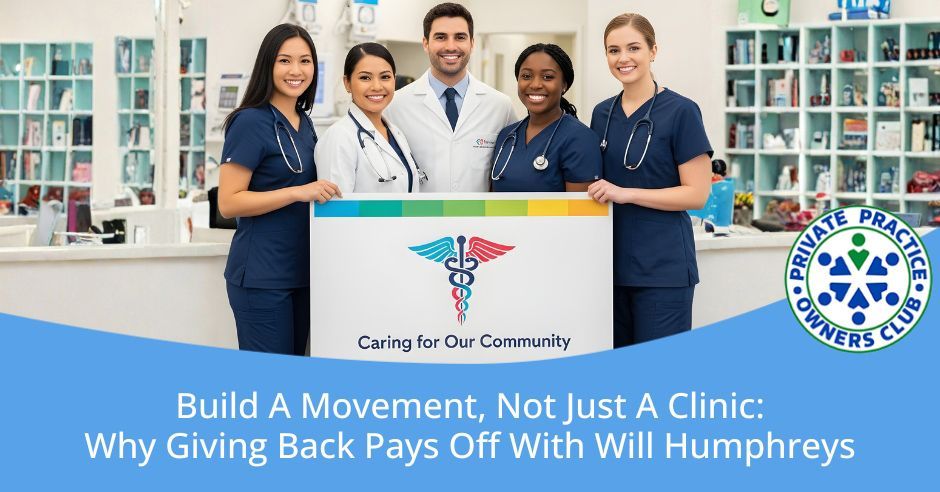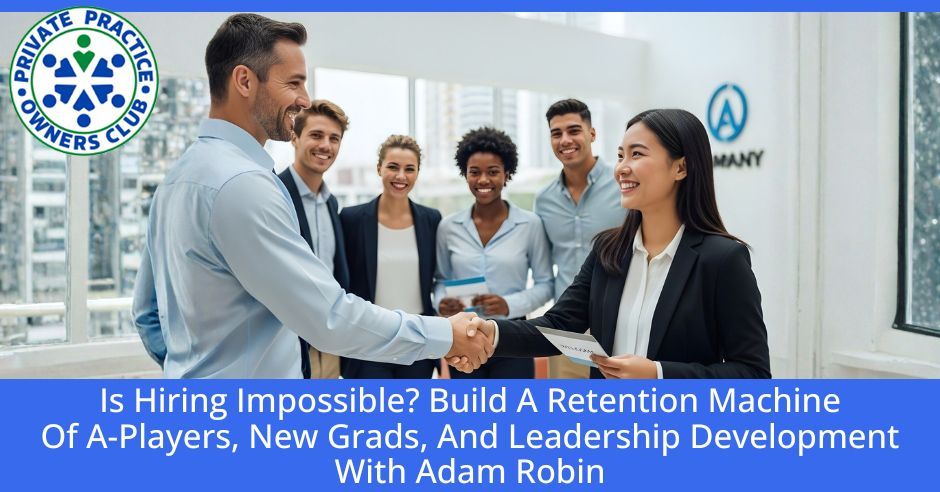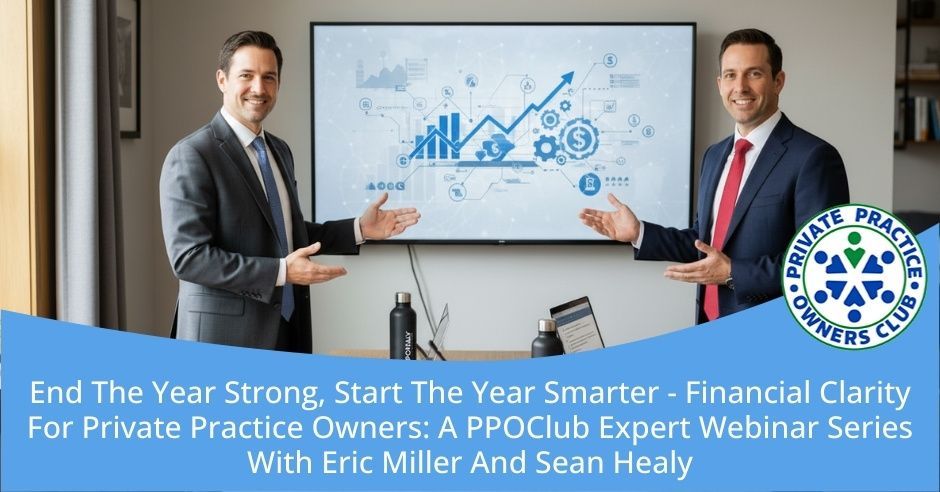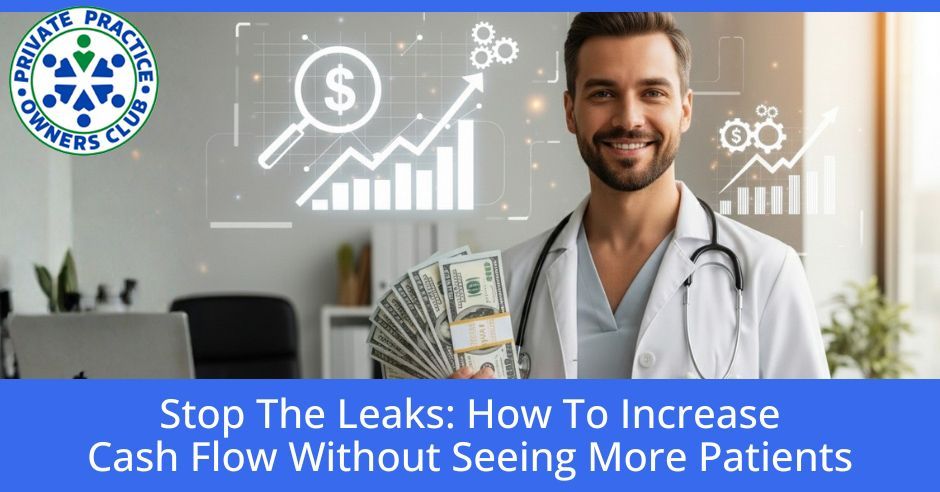John Askin is a financial advisor with Allied Wealth Partners who brings a unique perspective to his practice. A former Division I soccer player at Monmouth University, John knows firsthand the value of discipline, leadership, and resilience. Today, he specializes in working with sports medicine professionals—helping clinic owners, physical therapists, orthopedic surgeons, and athletic trainers build personalized financial strategies. His passion stems from his own experience as an athlete recovering from injury, fueling his commitment to support the very professionals who once supported him. Beyond his work, John is an avid fan of the Denver Broncos, New York Yankees, and Manchester United, and he enjoys life in Howell, NJ with his family and two dogs, Guidry and Archie.
The Financial Plan Of Care With John Askin
Most practice owners work 60+ hours a week trying to grow their business – yet when it comes to their personal and business finances, most are flying blind. What if you had a simple “financial plan of care” that gave you clarity, confidence, and a roadmap for building real wealth?
In this episode of the Private Practice Owners Podcast, Adam Robin sits down with John Askin, a financial planner who specializes in helping clinicians and practice owners take control of their money. John shares his journey from Division I soccer player to financial coach for practice owners, and explains why most clinicians never learned how to extract wealth from their business.
They dig into:
· Why cash flow is the number one metric owners must know cold
· How to separate business and personal finances so both thrive
· Why your business is not your retirement plan and how to fix that
· The “financial plan of care” framework that mirrors how PTs guide patients through rehab
· Why paying yourself first isn’t selfish – it’s essential
If you’ve ever felt like your practice is growing but your personal wealth isn’t keeping up, this episode will challenge your perspective and give you a path forward.
🎙️ Learn how to build financial health in your business and at home without the overwhelm.
👉 Connect with John on LinkedIn, check out his YouTube channel, and find resources linked in the show notes.
---
Listen to the Podcast here
The Financial Plan Of Care With John Askin
Welcome to the Private Practice Owners Podcast. I'm your host, Adam Robbin. I've got a special guest, a young hustler, financial planner John Askin, and he specializes in working with practice owners, helping them set out financial plans in their practice. He's all over LinkedIn. If you guys haven't seen him, check him out. He's going to tell us a little bit about how to put together a financial plan and make some money. How about that?
Sounds good to me.
Financial Planner And Money Therapist John Askin
Introduce yourselves. Tell us all about you, man.
Where to start? In the beginning. You're absolutely right. I've been working in this space. I'm a financial planner. I work here in New Jersey, based out of the Jersey Shore. I got into this space right out of college. I was studying finance in college, and I didn't really know originally what I wanted to do. I interned in this career and really fell in love with it. I really liked working with people, having a direct impact on their lives, and being client-facing.
I didn't really want to sit behind a desk and work for a corporate company in New York City like a lot of people do in the metropolitan area around me. I was always an athlete my whole life. It always was something where I thought a lot of athletes gravitate towards this career. There is a sales component to it. There's a hustle. You've got to build up your own practice basically from scratch. I saw it as almost like a challenge, and it definitely was. When I first started, it was just to be everything to everyone. I didn't really have a niche.
You cannot really niche down too soon. We'll get to how I got there. I started to find that there was a gap, and I enjoyed working with a lot of practice owners. I had some connections, thankfully in the space specifically in physical therapy, that I had known and just naturally reached out and said, “Listen, this is what I'm doing, I'd love to tell you about it if there's any way to help, absolutely. If not, just want to get my name out there.”
They actually started to say yes, like, “Yeah. I had a question about this.” I put two and two together, and I came to the conclusion that there's a lot of really intelligent business owners out there when it comes to being a therapist and/or a physician or a doctor, and they're doing that and then starting the business. When it comes to the planning aspect and extracting wealth from the business, all that stuff, there's no real education on that.
It's pretty much either that, maybe they had a mentor who probably didn't have any education in that, and schooling, you go through all these years of schooling, and it's not really talked about. I thought naively, it was like, I thought they knew everything. I'm like, “They're a doctor. I think they know all this. They should.” I go and talk with them, I'm like, “They don't.”
They probably should because they're so successful in terms of everyone looks at doctors, PTs who have higher education than most, but the financial aspect of things was never really talked about. I carved out my niche in that space and have been doing that for about three and a half years now. I'm working primarily with individual healthcare clinicians, PTs, OTs, physicians, surgeons, and also the Private Practice Owners, helping them create what I call their financial plans of care. It's been really fun.
I enjoy working with these people. I think it's also due to my experience as a patient myself. I think that's also maybe a good segue here. I was a Division one athlete, played soccer my whole life, played at Monmouth University here in New Jersey, and never so much as had a minor growth plate injury in my elbow when I was eleven. That was like my only injury, and I ended up tearing my ACL. Pretty major injury in sports, extensive recovery, did the whole rehab process.
It was really just trying to get back to playing at that point. I didn't really care. I was a sophomore in college. It's like, “I just want to play soccer, man. I'm not worried about where I'm going to be in my career five years from now.” It comes full circle. I can speak from experience about that process and have essentially formed my entire financial planning process around it, similarly to a patient's rehab process.
I found that the simpler I can make things for clinicians and owners, the better and the more they actually implement. Money's tough, number one taboo concept. There are a lot of moving parts as a practice owner. That oftentimes is one of those things that, “I'll get to it when I get to it,” or “My business is my retirement plan.” A lot of those things come out, and I've been a sounding board for those people and found that they're willing to listen and also work with someone like myself because they don't know what they don't know a lot of times.
As I said, full circle started out in this career. I didn't really know the path I was going to take. Maybe by chance, I fell into this. I wasn't really planning on going this route. Part of me was like, “I'm going to work with professional athletes,” or something like that, because that's what my experience was. I just carved out this niche, and here we are talking on this show, man.
Keeping Your Finances As Simple As Possible
I love the hustle, man. I love how you mentioned just be everything to everyone. Through those repetitions, you found your niche. You found the gap that you're talking about with practice owners. I also love the idea of the financial plans of care. I want to get into that in a little bit. First question that I have is, you mentioned simpler is better, or maybe you didn't say that, but that's what I think. Let's keep things really simple, right?
Yeah.
If you had to bullet point like 1, or 1 to 3, these are the three things you have to get right. Do you know what I mean? With financial planning, whatever that means in your world. It could even just be the one thing. What are those 1 to 3 maybe items that you really feel could make a big impact for practice owners?
I want to preface this with, and this can sometimes get misunderstood, maybe when I say this, simple is very different than easy. It's simple, it's not necessarily easy. There's a big distinction there. I'll see where I'm getting to there.
Simple is way different than easy.
The answer is always easy, but it's always challenging to execute. It's the execution that's the hard part.
It's a simple concept. Like, “I can do that.” It's just when life gets lifey, I always make a joke of you got to stay disciplined.
It's always easy. You want to get in shape, so start working out.
Start working out and eat a little less junk.
You want to have a business, so start asking people for money. It's always easy, but it's hard to execute.
Yeah. The number one thing for practice owners is what I see 9 out of 10 times. There's very rarely that I come across an owner who has this down to a tee, and it's just business in general. They're not these massive conglomerates like Amazon and Google that got a CFO and ten people working under them, and they know their numbers and they got public reporting, all that stuff, but the cashflow.
Not necessarily just the business's cashflow, but also their personal cashflow. I have to sit down, and that's like, it could be two bullet points, but I put that under the one most important thing, you have to know your numbers. I'm talking from someone who's probably a little more established. When you're first starting out, maybe it's just you, or maybe you and one clinician. The most important thing is just getting more patients in the door.
You've got to grow first before you have to give a crap about what your profit margins look like. You've got to actually have a business running and a well-tuned machine. When you're at that point, it's really important to understand your cash flow because most business owners are making a lot of money. They just don't feel like it because they're spending on a whim.
I get that.
They don't know when the right time is to hire a person. They're waiting until it feels right, like “We had a great month. Now I can hire,” instead of like, you probably had three months of that, but you just weren't looking at your numbers enough, or you didn't know them down. I make a point of saying to clients, “Listen, I should be able to wake you up in the middle of the night, and you should be able to recite to me roughly what your revenue is at year to date.”
What's your EBITDA? What's your cash flow look like? Are you operating in a deficit this month? Not to the dollar, but you should know the answers to that as the owner. A lot of times, the response is, “My bookkeeper has that,” or “My accountant has that.” It's like, “Great. You need to know that, though, because your bookkeeper doesn't give a crap as long as you pay them monthly for their services.”
Their job is not to tell you, “You have a thriving business or not.” Your accountant's job is also not to tell you that either. They're there to tell you, “Here's how much you owe, here's a couple of things we can do,” or “Here's how much you're getting back. Here's your monthly, your quarterly estimates that you need to be making.” Other than that, it's on you. If you don't know your numbers, you're lost. It's like navigating, you're just like, “I'm driving down this road and I'm heading west. Eventually, I'll get to California, I guess.”

What if you keep driving and you just go right to the ocean? Knowing that is really important because once your numbers are from a financial planning and like a business planning, because I always differentiate the two, especially for owners, and this will be great for anyone who's tuning in, there needs to be almost two plans. Every owner I work with has two plans. There's the business plan from a financial standpoint, and there's a personal plan. I'll pick on you, Adam. Adam's personal plan of what he wants for his family, his legacy, his kids.
What he wants personally out of life, but also the business side of things. What is the business doing to grow? How much are you investing in marketing? How much are you investing in your building and the products that you buy or sell, or anything like that? They're two very different things, and a lot of times this starts to happen. It's co-mingled. It's like, “I'll buy the house or the vacation home when this happens in the business, or I'll just take a big lump sum and I'll make it back in the business.”
Oftentimes, they're co-mingled, and there's no real strategy or vision around, like, how are you going to take what the business is creating to build your own life personally, but then also not rob from the business's profitability and where you see the business in twenty years. That's a really tough thing to do because it takes a lot of work, I won't lie. I'll give an example of a practice owner I'm working with now.
We onboarded them at the beginning of June. We've had about twelve meetings since then. They went from only making like $300,000 to now doing about 2 million a year. They've grown very quickly. With that comes a lot of things that you now have to implement. Hiring and taxes are a big thing now. You don't realize how much you owe and all that stuff. It's been a lot of work. I'm not saying that to scare you. It's just that they're going to be in such a great spot in ten years because they started it now, rather than if they started ten years from now and then they were like having that, crap moment of, maybe now I should probably start figuring this out.
All that opportunity cost they lost along the way. Again, not to get too detailed on it, but I really think the cashflow is so important when it comes to, especially to business owners, because there's so much nuance. If you're a W-2 person and you're in a single-income household, you have your monthly bills, your mortgage, there's nothing wrong with that, but it's a lot simpler to track everything.
When you're taking income or salary as a business owner, and how you structure that, and how you pay your employees and benefits, and all that stuff, you need to know what your cash flow looks like. That's why I say if there was one thing that they need to know, it's that. That's what a lot of times we have to go down, and the answer is “No. It's my job, and they hire me to do so that they can say in three months. Yes, I know it in the middle of the night. I know my numbers.”
I love that. That lands because that's where we start in our program as well. We always start with the data. You cannot really make decisions until you understand how those decisions affect your business. The language of your business is data, metrics, and numbers. You have to learn how to speak that language. We start with data, and we cannot really even implement systems until we understand our data. We have to have data.
Why Financial Planning Should Be Personalized
I got a question, though. What I generally recommend, and I might change my recommendation based on what you'd say. I'm sure you've heard of the 50/30/20 personal plan, where it's like 50% of your income is spent on needs. Was it 30% on wants? 20% is savings or whatever. That's what we do in our home.
A lot of, for me, I felt a lot of freedom when I defined that first. Whenever I was like, “This is what my home needs to operate.” From a bare bones perspective, like I got two kids, I got a mortgage, I got a house, like I have to have X amount of dollars coming into my home every month in order to live and to function. I would basically demand that from my business. The question became, how do I create that inside my business?
I want to create that as an expense line. Adam's home, whatever that is, through salary and distribution. I find a lot of comfort whenever I define what I need in my personal life and demand it from the business. Not the other way around, where I define what I want in my business and demand it from my personal life, because then that's when you start to get that, “I'll just work later. I'll just borrow money from the business,” or “I just won't take a salary this week.” All those things. How do you recommend starting? Where do you usually start?
I mean the 50/30/20, if it works, think that's great. Everyone's different. There's 50/30/20. Sometimes people are like, 30/30/30, or 30/40. Everyone has a different number for their lifestyle. It's very different, like if you have a wife and two kids or if you're single. You don't have a mortgage. There are very different things. Number one, financial planning is personal. There is generic advice out there. It's generic for a reason.
That's definitely generic. I got it from the internet.
It is, but you've personalized it to you, though. Because if it didn't work for you, you probably have something different. You said, “No, I'm going to have 50% because that's what I think makes the most sense for my family. If we ran the numbers, it'd probably be a little bit, maybe it's totally, I've heard. It's probably going to be skewed a little bit. You stuck to it, and it works, and that's the best thing. For someone else, it might not. What I do a lot of times, and it does vary because I don't think there's a one-size-fits-all approach. We implemented something called a reverse budget for owners. It's basically the same type of concept. I almost explained it differently. You're paying yourself first.
Love it.
Meaning a business owner. I'm to use the business owner that we're working with right now because it's top of mind for me. They're saving for a house that they're looking to buy in the next year. That's automated. We're saving $25,000 a month towards that out of the business. We're automating their 401(k) contributions as well as profit-sharing component. That's a non-negotiable for them because if they want to get where they want to be in retirement, we have to do that. They understand that.
Again, this is someone who's humming in business, so we can tap right down to maybe a little bit smaller scale, but I'll start there. It's okay. How much do they need to save for taxes? A lot of business owners don't realize, at least when they're first starting out and they're starting to make money, it's like, you've got to make quarterly payments out of your business, safe harbor, what are those? We automate that.
We have them basically automating that to a separate bank account for taxes only, so that they don't even have a chance to spend that in the business. I've seen multiple times where business owners are like, “Get money, receive it, and then it's like, “Crap, by $300,000 in the bank account isn't really $300,000 because I know X amount to Uncle Sam.” We've automated all that. Done. Whatever that is for you, you have to define it. It might not be to the extent that my client is, but maybe it's you're doing a thousand bucks a month into your 401(k), or even you don't have that.
It's what I am reinvesting into the business until I get to that point. Once you've done that, “It's okay. I've taken care of it. I paid myself first.” After that, I take care of exactly what you did. What do I need to live off of? What are my fixed expenses? You have to be really strict and understand this because sometimes people can get lenient with what is actually fixed. Food, shelter, water.
Totally. Thank you for saying that.
That is your fixed expenses. I also need to have hard conversations with people.
You cannot donate to the charity every month.
That's another thing. You've got to put your oxygen mask on before helping up.
I have these conversations with practice owners. They're like, “I'm barely making money.” We look at their books, and they're like, “I'm donating a dollar a month to charity, and the business is paying for my mortgage.” You've got to pay, like that's not the way this works. You're saying not 47 visits a week, like you got to hustle.
If you have kids, it's like “How do you put food on the table? How do you keep your utilities bill, your utilities bills,” all that stuff. After that, you're going to probably need a car to drive, but if you're a practice owner, listen to this, don't go out and just buy the nicest car because you can, and there's the whole section 179 write-off in it. This isn't tax advice or anything like that, but I know a lot of business owners can get a little bit lenient with that.
Do not go out and buy the nicest car just because you can.
Remember, if it's a write-off, it doesn't mean it's free money. It's a savings, you actually spent, you're in the 30% tax bracket. You spent 70% on that. You didn't save 30%. Don't get that confused. Identify what you need to actually function, what your family needs, in the same way you did. Everything else, you don't really have a problem if you like to spend a little bit more that month, or you reinvest a little bit, or you splurged and went on the vacation because that extra money was discretionary.
Meaning you already took care of your future self, you took care of your current self. The rest of the money is there to enjoy the fruits of your labor. What do most people do? They enjoy the fruits of their labor, they barely scrape by with their mortgage and their fixed expenses, and then they save what's left over, and it's usually not a heck of a lot.
When that happens, the longer you do it, like any habit, the worse it gets because it's a hell of a lot harder. They always say, “I'm going to do it when I make a million,” or “If I make a million and a half, my business is making $3 million.” Guess what? When your business is making $3 million, you're going to somehow figure out a way to spend $2.9 million.
You are not lying. That's so true. I've had to learn that the hard way. I used to think just like, it's the whole problem with thinking that top-line revenue is what matters.
Go make more money.
It doesn't matter.
“Next month, I'll treat five more patients, and I can pay for the vacation.”
Two things that land for me. Number one, your business is starving, and it has an appetite that never ends. Any money that comes in, there's going to be so many things trying to grab that money and gobble it up. It's going to be people trying to sell you a coaching program. It's going to be a new EMR. It's going to be Amazon.com, whatever. It's going to be people stealing from you.
The BioDex machine's got to come in.
Your Business Is Not Your Retirement Plan
It's all the little things. If you're not disciplined with them and you're not funneling that money down to the bottom line with intensity and some type of demand, it's not going to make it there. Your business is starving. It'll never get full. It's going to eat everything that you allow it to eat. I'm stealing this from my friend, Greg Todd.
He said, basically, like you said, “In the beginning, we make the mistake in thinking that we're just going to work our ass off and then whatever's leftover at the end of the month, we're going to battle for ours. If there's anything left.” When you operate that way, you're essentially telling yourself in the world that the only thing that you're worth is the leftovers. I like the leftovers. Nobody likes leftovers, man. Let's be real.
They're not as good.
You want the hot and ready, man. You're that first bite. Pay yourself first. You're valuable. You're worthy. You, as a CEO and the owner, and your household and your kids, like don't be greedy, but also recognize that there is a need and a necessity that you have to have. If you're not taking care of yourself, you're not going to be able to take care of everyone else. Pay yourself first.
I have a big saying or philosophy on this, especially with practice owners, that there's a big misconception. This is for most, not all, but most. Most private practices in this country, whether you're a doctor, a PT, or an OT, are not the conglomerates like we're seeing across the country. They have 3,000 clinics, the ATIs of the world. That's not you.
You may have maybe 3 or 4, and it's you and maybe 30 to 40 employees. Some or most of them are even smaller, actually, from what I see, the ones I work with. Your business is not your retirement plan. The quicker you realize that, the better. I'm not saying it cannot be, but a lot of times people have this mindset because they see the Jeff Bezos's and the Elon Musk's, the world that builds all this wealth, and then they could retire and obviously whatever the hell they wanted to, they don't have to work.
Your business is not your retirement plan.
Even on a smaller scale, someone builds up $100 million construction business. If they sell the business, there's probably another construction business that's willing to buy it. It can run seamlessly without the CEO being there. This ties into your coaching that we talked about on my podcast, but a lot of times, they're their own worst enemy and bottleneck in the business because if they go to sell and they don't want to stay on, their business is not worth what it's worth, what they think it is.
You could be doing $2 million a year, but if you're the main person running the show, or if you and maybe your wife or someone isn't going to be around for the company that's going to come by you, or the new PT that you've mentored that's going to buy you, the business is not worth it. If that's your only retirement plan and you're banking on that, you're setting yourself up for failure. I'm not saying that it cannot be there because you're probably going to be able to sell it for something. It's still a business.
Here's the risk. I know this because I've got a good friend who's in the mergers and acquisitions space. Ninety plus percent of the practice owners that he works with are people who have held onto their business for too long. They got older, they got tired. Their skill sets, and I don't mean like treating patients skill set, but I mean like business, like keeping up with technology, innovation. It takes some energy to be on the cutting edge, and if you get behind, people start leaving. You lose some key leaders, and the next thing they're there by themselves with a front with an aid, and their business isn't worth anything. You've seen the old boxers that they want to go in one more round, one more fight. They end up getting knocked out.
They get killed.
That's the same thing with business owners. We don't usually go out with a bang because usually we don't have a real plan of exiting until it's too late. Start early, have that plan now, and also definitely don't bank on that being the home run, because it might not be.
I always talk about extracting wealth from your business. Not in a greedy way. It's not that you're going to extract all the wealth from your business because then you're basically funneling the blood out of the body. How much can we take from the business and build in Adam's personal accounts or investments so that he can one day say, “Even if this business sells for pennies on the dollar, I've built up my net worth over here and I use this business as a tool.
Maybe I was able to pass it on to the guy I mentored, and I wasn't worried about the top purchase price for him because I remember my shoes back in the day, and I would have wanted that opportunity for myself. Because I put my own oxygen mask on financially, I could then go and help others. The more likely scenario if you're going to sell to a private equity or maybe another bigger business that you're going to merge into, well, guess what?
They're going to look at every single thing and dissect it and analyze, and they're not going to sell for what you think it's worth. The whole “I sell for three times revenue,” whatever that came from. That's probably not going to happen because then they ask you the question of, like, let's say you're 65 years old and you're like thinking, “I'm going to get this $5 million payout and then I'm going to ride off into the sunset, retire and live in Florida every day of the year.”
They say, “By the way, you've got to stay out with us for ten years.” You're like, “That's a lot different than what I planned for.” They're like, “No, you can do that, but just letting that $5 million now it's $400,000.” You're like, “I put all my money back into the business, into my people. I thought I was doing the right thing and then I'm left here like I either got to stay and work as an employee now to a bigger company,” or “I got to sell for something that's not able to sustain what I thought I would.’”
Meanwhile, if you have the whole time, you have leverage and you're like, “I got $3 million out here and I've used that and built up my bank, role on my personal side. I've got the leverage now. I don't need you. I can go on to this thing, and they can go to zero, and I don't care.” You have a little bit more leverage. At the end of the day, everyone ends up winning because of that, because if you have employees, you're not just letting go of the business for the top purchase price.
It might not be the best fit for what you built up, and you're just selling to the person who gave you the most money. You made friends who were employees who worked with you for ten years, miserable in the process, and so you just wrote them off. There's an aspect of being a little bit selfish when it comes to that, for like the 30 years of building the business. Instead of trying to be like, ‘I'm going to put everything in the business, I'm going to sell it.”
When that time comes, you're shocked. I've seen that. That's a lot of times what we talk about is, like you said, paying yourself first and having a strategy. You really need to come up with an exit strategy. Personally, I think at least five years before you're even ready to sell. You've got to make sure your books are in order. You've got to make sure your numbers are the most important thing because they're going to ask for it day one. You think I'm asking for it, wait until you go to sell and this. Let's see the books. “Bookkeeper, can you get the QuickBooks?”
“I haven't talked to my accountant in a year.”
Like, “I got to get my bookkeeper. Can you update QuickBooks for the last seven years?” Maybe I should have updated those quicker. I'm really a big advocate of that, like that's all where those two different plans come in of having a plan for Adam personally and having a plan for the business, and how do those work? It's all one big plant at the end of the day, but there are two aspects to it. That's a lot of times what I sit down and work with.

That's the hardest part because we're answering some questions that probably haven't been talked about before. It's always been about how much bigger can I make the business? How can I grow? How can I get more people? All of a sudden, you wake up and you're like, “Maybe I didn't think about myself as much.” It's no fault of your own because you do have to a certain point really only care about the business, or else there's no business to even extract wealth from.
It's the leftovers, man. You get the leftovers.
I think this is a good segue into that financial plan of care that I've come up with. Number one, I think it resonates with clinicians because you guys are implementing plans of care all day long. That's the business model. How many completed plans of care? How can we make sure that we're having them completed from start to finish? I try to make, like I said, speaking the language and making it similar to that process.
I think a lot of times it can be scary talking to someone in my industry. There's unfortunately a stigma around it that it can be sleazy and salesy, and you're going to be pushed into something you might not need, which, unfortunately, there are always bad actors, but I think I lead with the plan and let everything else follow with the practice owners and the collections I work with.
The same way someone would tear their ACL, and you're not like rushing to sell them the newest knee brace, you're like, “Let's take it one step at a time. We're going to have the pre-hab, then we're going to have the surgery, then you're going to come in, and then we're going to start out. We're going to start small.” Eventually, you might need a knee brace when you go back to certain activities, but we're not just shoving that down the throat like day one. It's like, when I implement, because I remember for me, like I refused the knee brace.
I was like, “I'm playing soccer. I literally trap a ball on my thigh. I'm not wearing this massive brace. I'll figure out how to do it without it.” I talked to my PT, and he was like, “That's okay. We'll just make sure that you're a little bit stronger before we give you the okay to go back to playing.” Again, it's very personalized, but back to the plan and care thing. I say, “You guys are really good with muscles. I'm good with money.” It's the same thing, just a different M. We're still going to take the same approach. It's an acronym.
The C is the clarifying of the goals because I think everything needs to start with what your goal is. You can save $1,000 in an investment account, but for what? If you're someone who's like, “I don't really want to retire, like I might want to work until I'm 70.” Very different than the person who says they want to retire at 55. Different needs. We have to clarify those goals. What do you want? Someone in your position who has a wife and kids is very different than the person who's single.
It doesn't have a lot of expenses or a mortgage, and they're just running the business because that's what they want. You've got to clarify those goals. You really got us, the A is the assessing of the finances. This is the knowing your numbers. Actually, the first part is me getting clear on, like, what is your goal? What the heck do you want to accomplish? I can help you get there, but if we don't have a vision, like we're just wandering on a path.
We don't need to, we're going. If you don't have vision and clarity, you're never going to get there because the days get hard. You're like, “I don't really know what I'm doing this for. If I slack off, it doesn't really matter.” If you're like, “No, I've got to get my kids to college. I got to pay for that myself. I don't want them to ever go into debt and be able to retire and be with my wife at 55.”
You're setting budgets and restrictions around your life. It's going to be tough. You've got to want it. You've got to know where you're going with it. Make sacrifices, right?
Yeah. That's like anything, like I know you train for races and things, and I do the same thing. If I say, “I'm going to run the Philly half-marathon, “I'm just going to show up and run,” but like, “I'm probably not going to do as well as if I implement a plan.” I actually have a plaque here. I ran 42 hours in New York, so my goal is 30 for this one. It's a very different training plan than someone who's trying to break just two hours.
Different regimen, and there's nothing wrong with either, but if you have that clarity and that goal, you have something to work towards so that those harder days, they become just that much easier, like, “If I want to get there, I've got to just do it.” There are going to be days that suck in training. I don't care if you're an athlete or a business owner or anything, there are going to be those crappy days. It's human. It's what happens.
I do financial planning, and there are some days when I probably spend a little more on this. I come back, what do I actually want to achieve? What are my goals? I'm like, “Let's do the 24-hour cooling off here to see if I actually need to be there.” Anyway, that's assessing the finances after we get clear on our goals, because then once we have the goals and the finances figured out, then we really have the recipe for success of what we have to work with and what we are working towards.
Figuring out your goals is the main recipe for a successful financial plan.
How can we allocate that capital to accelerate how quickly we can get to those goals or keep us on track so that we can accomplish them in the timeframe that we need to? It's different for everyone, but that's where I come in, and I make sure that I'm asking the questions that they probably may not have thought about before, the hard questions. Sometimes the layups are like, “When do you want to retire? What do you want to do with your business?’ It's like prying and prying and really getting down to the root of it so that they're buying into the process.
Same as a patient. If you got someone that comes in and you're like, “We're just going to get you back and you'd be able to walk a mile,” versus the grandparent that might come in and be like, “If I'm not able to play with my grandkids, like I have no purpose in life.” If they have that reason to show up to PT every time, and you like almost drive that knife into them like, “Listen, this is why we're doing this. I know it sucks, but if you want this outcome, I bet you they're going to show up more than just to need my knee to get better.”
Your Business Is Not Your Retirement Plan
You're like a coach, too. A hundred percent like coaching people to maintain accountability around their plan.
I call myself a money therapist.
You're like a PT. PT is the same way.
That's why I love working with people in your position and owners, because they understand what a plan is. Number one, because they've been taught how to set a goal. You go to school to learn how to implement plans of care for patients, except that the roles are reversed. “I'm now your PT. You're the patient. We're just talking about money.” Once you've coached and been a player, you can get both sides. It's very easy.
I found that practice owners and clinicians get it, and they actually implement it more than most. I have other clients that are not clinicians, just for my career, referrals, and things like that. They're a little bit tougher to work with, depending on their career and what they've done in life. I've found that that's also why I really love working with them, because once we get the buy-in, it's like, “Take action,” because business owners, the best ones, they don't second-guess things.
They take action, look at the results, and fix. How can I complete and just take action, learn from it, and get better? The R is the recommending of strategies. It's like, “Here's your goals. Here's what I'm recommending.’ It's not that it's the law, and that's my advice, is the end-all be-all. They're paying for the advice, but it's more of, “Here's what I'm recommending. I think I can get there.”
We almost have another brainstorming to make sure that it makes sense. Maybe we're adjusting some things. Maybe I said to save X, and it just wasn't as achievable. “Let's dial it back a little bit, but we still made progress. That's the E part, which is the most important in my opinion. It's the evaluating of progress. It's the same thing in treating a patient.
I show up, I'm going to use myself because I can speak on that the best. I tore my ACL, and I showed up to PT after getting surgery, and my knee is looking like a bowling ball, bruised and in pain. If my PT just handed me a piece of paper that laid out the plan of care for the next 12 months, for 10 months, he said, “Here you go, bud. Put this together. Good luck.”
“You got it, kid. Open the leg.”
I would not be on that soccer field. I didn't have ChatGPT to tell me how to do it. It would not have been as successful if I weren't showing up every week and committed to getting better. I was the one who had to actually do the work, but I had the sounding board and the coaching aspect to like, “Do this,” or “Tweak this, or “We're going to ramp this up,” versus like, “I need to do ten squats and knee extensions.” That was easy, but whatever, I did it.
It's your coach, man. You're a financial expert. I can totally understand, especially with practice owners, business owners, like we're busy. We don't think about money. We worry about money more than we think about money. I love how you are able to look at the financial health of their business without emotion and play offense. How do we play offense? A lot of times, with business, especially with private practices, it's hard to win in private practice.
They're good at defense.
You’d be like the leftovers, and there's a lot of fear and insecurity around our money. It's just think about it. Here's this person in the corner working 80 hours a week, fearful, insecure, and you're just tired and burned out. You're probably not going to have good financial health in about 5 or 10 years. What do I mean?
Yeah. It's going to bleed into that.
I could definitely see how working with somebody like you would be super transformative, man.
Evaluating and looking at progress, it's almost the accountability aspect that's more important. It's like, “You told me this is what you want to achieve.” Six months later, your motivation is fleeting. You're probably not. I'm going to be here saying you told me this, “Let's have a meeting. We're talking about this now, forcing you to do this.”

Also, maybe the business grows and then you have to pivot the plan and make new goals, or it shrinks. Maybe you sell something. I totally get it.
It's always changing.
Get In Touch With John
How do people get in touch with you? Where do they find you? I'm sure somebody could use your help.
The best way is that I'm really active on LinkedIn. That's the best way to reach out to me. Shoot me a DM there. My contact info is in there. If you click the button, you can probably send me an email and stuff, but shoot me a DM on LinkedIn. Give me a follow. Connect with me. If you want to have a conversation, I always lead with like an intro call to see if it's even a good fit.
Some people are a great fit. Some people are not, I'll be completely transparent. I've got a ton of resources. If you're looking for things and you're like, “I got a question about this.” Don't feel ashamed to ask, and I've got a bunch of PDF guides that I give out, and then I've put together over my experience working with people in this position. I might have a free resource if you're not ready. I don't expect everyone to be ready day one.
You can enter my world that way. I've got a YouTube channel where I have interviews. I've interviewed private practice coaches like yourself. I've interviewed people who have even made transitions out of private practice and sold. There are resources there, but the best two places would be LinkedIn. You can find everything else that I have from there.
For those who are tuning in, if you check out the show notes, I'll have links to the YouTube channel. Your LinkedIn profile, and then I'll also have a link to your email.
That works.
Man, I appreciate the time. Let’s definitely circle back later in the year.
Absolutely. Thanks for having me.
Later, brother.
Important Links
- John Askin on LinkedIn
- John Askin on YouTube
- JAskin@alliedwealthpartners.com
- Private Practice Owners Club Facebook Group


